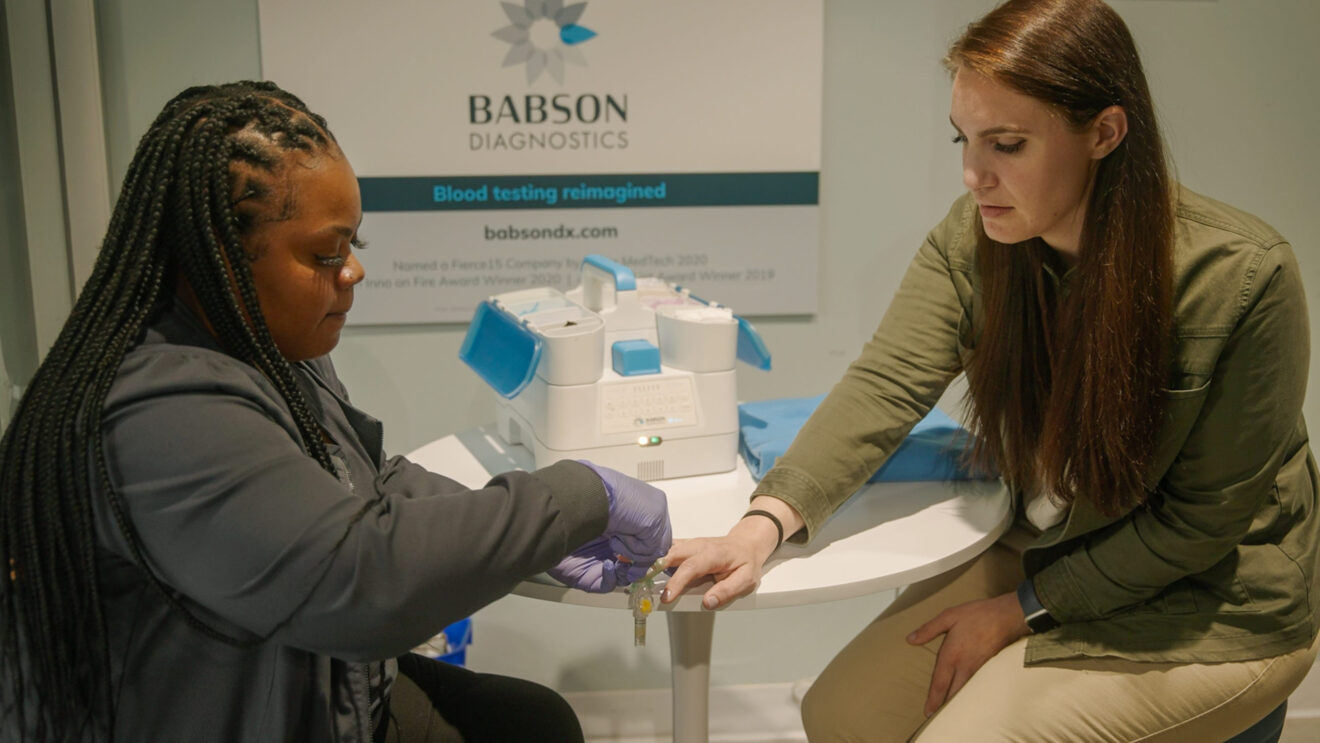This post is sponsored by Babson Diagnostics.
Health care costs are rising dramatically in the U.S., in part because costly conditions are not diagnosed early enough. But when people think about innovations that can reshape health care, they don’t usually think about blood testing. Babson Diagnostics is looking to change that. SmartBrief recently spoke with David Stein, CEO of Babson Diagnostics, on why this critical area of health care should get more attention.
Why should payers care about clinical laboratory testing?
Clinical laboratory testing plays an essential role in the delivery of health care. From early detection and diagnosis of disease to individualized treatment plans based on a person’s unique biology, medical care depends on accurate and timely health data. Seventy percent of medical decisions depend on lab test results, so making this important service convenient and accessible is key to improving health care quality and managing long-term health costs.
Take diabetes, the most expensive chronic condition in the U.S. More than 1 in 3 adults have prediabetes — about 96 million Americans — but 80% don’t know they have it. Blood tests play a critical role in diagnosing prediabetes and monitoring the impact of lifestyle changes.
The prevalence and cost of chronic diseases are growing in the U.S., in part, because we’re getting information too little, too late. We solve problems when we have the right information at the right time, and getting that information requires convenience that inspires action.
What are the challenges with traditional blood testing for both payers and members?
Traditional blood testing has not kept up with consumer preferences and innovations in health care. The modern consumer expects digital ease, retail convenience and useful health information that empowers decision making. Today, most people get a blood test at an independent lab or outpatient site, which are often only open during working hours and can be difficult for many to access.
Labs and outpatient sites employ phlebotomists who collect blood samples through venipuncture, a process that is physically and psychologically uncomfortable for many. In addition to these barriers, test results can be difficult to understand. Patients get their blood testing done and then have to see their provider again to review results that are outside normal ranges. These multiple visits add up to wasted dollars and time.
Can blood testing really be improved?
Babson Diagnostics is reimagining the entire diagnostic, blood-testing experience by making it less invasive, more convenient and more affordable. We will bring medically accurate blood testing to the retail pharmacy and other accessible health care locations by using a first-of-its-kind ecosystem that requires only one-tenth the sample volume of traditional venipuncture methods without sacrificing quality, accuracy, or the number and types of tests that are possible.
The innovative pieces of our ecosystem start with blood collection. In partnership with BD (Becton, Dickinson and Co.), we have developed a proprietary finger collection device that doesn’t require a phlebotomist and minimizes the stress and pain associated with a needle stick.
Babson has invented a compact microsample workstation that automates identification, mixing, and centrifugation, and maintains optimal microsample conditions at all times. It reduces human interaction and error while maximizing quality and reducing sample waste by 93%.
We are also developing an intuitive digital experience that delivers easy-to-understand results to patients and providers that same day or the following day.

How is Babson’s model of testing expected to make a difference in the member and provider experience?
About 40% of people report skipping a recommended test or treatment. We believe we can increase compliance with testing with our innovative technologies and service.
Our model combines the best of traditional labs and rapid testing. Rapid testing offers convenience but has a limited test menu and comparatively higher costs. It also does not always provide medically accurate results.
We see care shifting to local community settings, such as retail pharmacies that offer longer hours of operation. Most Americans live within 5 miles of a retail pharmacy. Because consumers are already visiting them for prescriptions and everyday items, they are more likely to have regular interactions and a relationship with their local pharmacy team. By eliminating the need for a phlebotomist and automating sample handling, we enable the pharmacy team to add medically accurate blood testing to their increasing menu of health services.
Our latest customer preference study in a retail pharmacy showed that 85% of participants preferred capillary blood collection over venipuncture, finding it more comfortable, faster and less painful. People also greatly preferred going to a pharmacy, citing the convenient location and a feeling of comfort with the pharmacy staff.
Another area of consumer preference to emerge recently has been telehealth. A barrier for virtual health, especially stand-alone telehealth providers, is access to timely health data. Babson’s diagnostic innovation can make these virtual visits more actionable and lead to improved adherence and disease management.
What value will this bring to health plans that cover these blood tests?
Payers are increasingly focused on member experience to increase their health plan engagement and, ultimately, improve health outcomes.
We’ve all seen what happens when we don’t have access to care or defer care. We are going through a crash course during the COVID-19 pandemic, and the outcomes aren’t good.
Moving forward, we must extend the medical home with a mix of retail, virtual and at-home care. Convenient, medically accurate blood testing gives providers real-time insights to inform and adjust care plans, make medication adjustments, counsel patients on condition management, and add new interventions and treatment options.
This type of actionable preventive care has a real impact on downstream claims and may lead to fewer unnecessary emergency department visits, fewer hospital admissions and readmissions, and better outcomes in key quality measures such as improved cholesterol control and adherence to best practices for treating diabetes. This in turn helps payers in the managed care and Medicare space raise their HEDIS and STAR quality scores — important measures that can lead to financial bonuses and incentives.
New payment models focused on quality and outcomes rely on active preventive care and accurate diagnostics. The move to value-based payment models supports better care for individuals, better health for populations and lower costs. By meeting patients where they are and empowering them to take charge of their health, we can accelerate the shift of the nation’s health care system to one focused on quality, proactive care and wellness.
David Stein is a healthcare leader who has spent his career building world class teams to drive disruptive strategies and innovation in med-tech and diagnostics. Before becoming CEO of Babson Diagnostics in 2020, he was global head of strategy and president of Molecular Diagnostics at Siemens Healthineers, a global medical technology company focused on laboratory diagnostics, diagnostic and therapeutic imaging and molecular medicine. David spent 18 years at Siemens in several leadership roles, including CEO of the point-of-care business, head of strategy for the Diagnostics division and global vice president of engineering within the Diagnostics division. While at Siemens, David was instrumental in incubating the business that became Babson Diagnostics. David serves on Babson’s board of directors and is also the Board Chairman of PixCell Medical, a point-of-care blood diagnostic company in Israel. He earned his Ph.D. in engineering from Johns Hopkins University.
